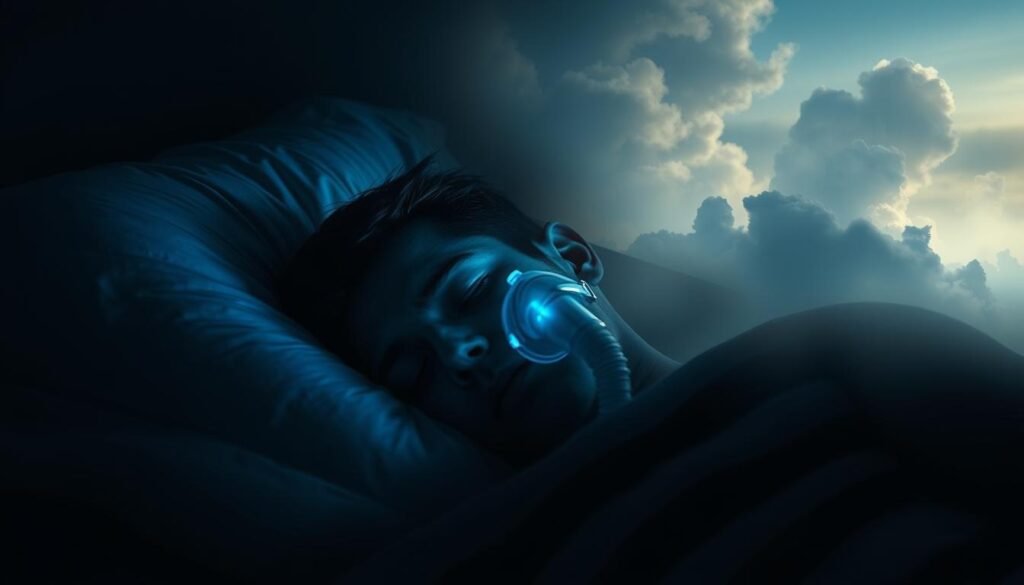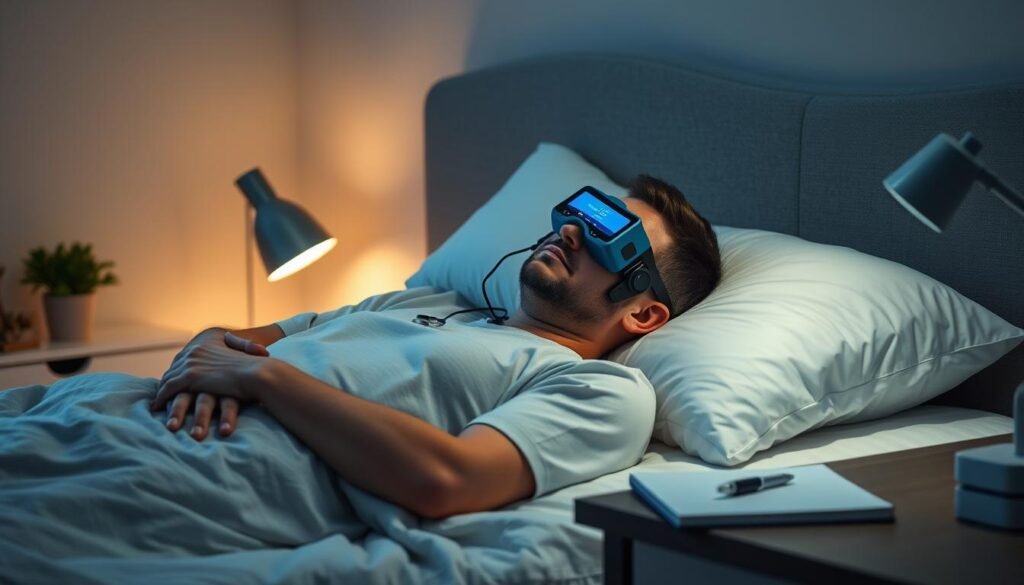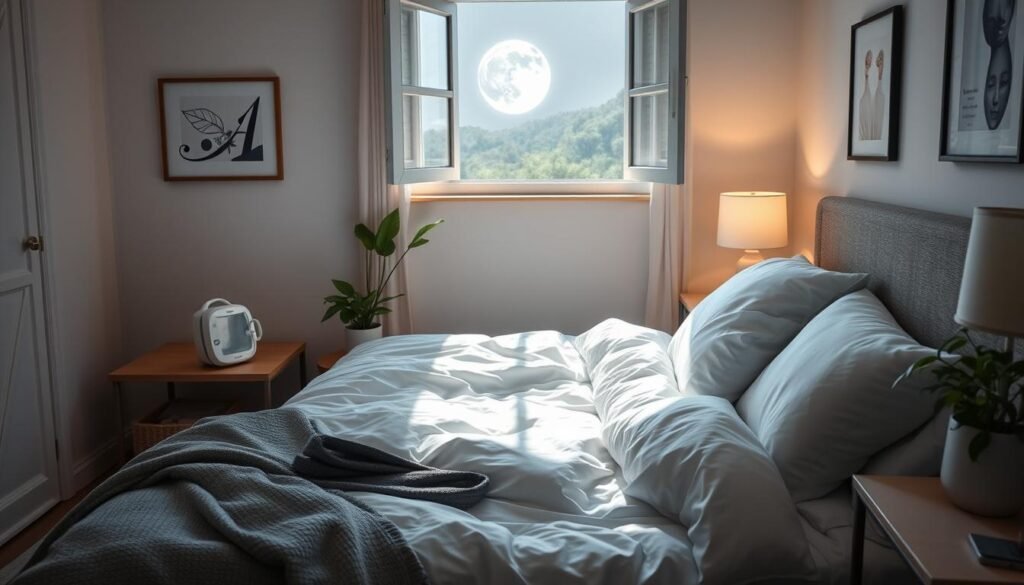Did you know that people with obstructive sleep apnea (OSA) are more likely to face depression? They’re 18% more likely than others to get major depressive disorder (MDD). This fact shows a key link between sleep apnea and depression. Understanding this link can help improve lives.
Studies suggest that checking for sleep problems in those with depression is crucial. Both conditions are often missed. This oversight can affect someone’s life greatly.
About 6% of men and 3% of women in the US say they’ve been diagnosed with sleep apnea. Knowing how sleep apnea and depression affect each other is critical. This knowledge isn’t just informative. It’s vital for creating better treatments and outcomes.
In this article, we’ll dive into both conditions. We’ll look at their symptoms and why catching them early is important for care.
Key Takeaways
- Patients with obstructive sleep apnea show higher rates of depression than the general populace.
- There is a bidirectional relationship between sleep apnea and major depressive disorder.
- Early detection of sleep apnea can improve depression treatment outcomes.
- Significant symptoms may resolve when patients receive CPAP therapy.
- Screening for sleep disorders should be a standard part of mental health evaluations.
Introduction to Sleep Apnea and Depression
To grasp the link between sleep apnea and depression, let’s explore what each entails. Sleep apnea is when breathing stops and starts during sleep. It’s known for loud snoring, choking, and feeling very tired during the day. About 20% of people have this condition, yet it’s often not caught by doctors.
Depression, on the other hand, is a common mental health issue. It brings long spells of sadness, a feeling of hopelessness, and no joy in life. Studies have found that 5% to 63% of individuals with obstructive sleep apnea also have depression. This data shows the need to watch out for sleep apnea symptoms when assessing mental health.
Having both sleep apnea and depression together complicates each other’s effects. Research has found that obstructive sleep apnea might lead to major depression. Patients often see their depressive symptoms get worse with their sleep problems. Knowing about this early can help doctors and patients alike. It makes treatment better, helping those who suffer from both.
Understanding Sleep Apnea: Symptoms and Types
Sleep apnea is a common sleep disorder with breaks in breathing during sleep. The main type is obstructive sleep apnea. It shows up as loud snoring, daytime tiredness, and gasping or choking at night.
Those with obstructive sleep apnea face symptoms that lower their life quality. Symptoms include:
- Excessive daytime sleepiness
- Loud snoring
- Morning headaches
- Difficulty focusing during the day
- High blood pressure
- Mood changes like anxiety or depression
Recent studies show men are 2 to 3 times more likely to get obstructive sleep apnea than premenopausal women. Causes can be obesity, large tonsils, and some medicines. If not treated, it can lead to major heart problems.
There are three kinds of sleep apnea: obstructive, central, and complex sleep apnea syndrome. Knowing these helps with the right diagnosis and treatment.
Common Symptoms of Depression
Knowing the common symptoms of depression is key for proper diagnosis and treatment. Signs often include sadness, fatigue, irritability, and trouble focusing. People may lose interest in activities they used to enjoy, feel hopeless, or think they are worthless. Sleep issues, changes in appetite, and thoughts of self-harm are also common signs.
About 90% of those with depression struggle with poor sleep. This links depression to sleep conditions like sleep apnea. Shared symptoms include fatigue, irritability, and daytime sleepiness. Recognizing these shared symptoms is crucial for caring effectively. For more about sleep and depression, check out this detailed resource.
Depression symptoms like low energy and bad sleep make emotional problems worse. This keeps people stuck in a cycle of distress. Many with major depression also have sleep apnea. Spotting these signs is a big step towards more effective treatments. It shows how vital it is to focus on both mental and sleep health.
The Relationship Between Sleep Apnea and Depression
Doctors are now seeing a link between sleep apnea and depression. Studies show people with sleep apnea often have depression too. This link is important because it helps us understand both conditions better. A big survey by the Centers for Disease Control and Prevention found this alarming connection.
Co-Morbidity of Sleep Apnea and Major Depressive Disorder
Research found a lot of people with sleep apnea also feel depressed. About 6.6% of people without sleep apnea feel depressed. But, 13.7% of those with sleep apnea do. This means people with sleep apnea are more likely to feel depressed. Factors like feeling very tired and not sleeping well might be why. Data also showed that people with sleep apnea are 1.36 times more likely to feel depressed. This highlights the need for better screening.
Shared Symptoms: Overlap in Conditions
Sleep apnea and depression have similar symptoms. These include feeling tired, mood changes, and less sharp thinking. Symptoms like gasping during sleep also link to more depression symptoms. A study found that more sleep interruptions can increase depression risk. Screening for sleep issues in depressed people might help diagnose better. More info on this topic can be found here.

Impact of Sleep Apnea on Mental Health
More and more, we see how sleep apnea affects mental health. It really disrupts emotional health, causing more anxiety and depression. When sleep apnea keeps you from sleeping well, it can make thinking hard and worsen mental health issues. This struggle is real and ongoing.
Effect of Sleep Deprivation on Emotional Well-Being
Studies show sleep apnea increases the risk of mental health problems. Those dealing with depression are five times more likely to struggle with sleep because of breathing issues. Lack of sleep messes with your emotions. Interrupted breathing drops oxygen levels, leading to mood swings. It makes focusing hard.
- About 18% of people with depression also face breathing issues during sleep.
- Compared to 3.8% of those without depression, it’s clear sleep apnea impacts mental health greatly.
- Without management, anxiety risks are 3.68 times higher for sleep apnea sufferers.
- Those untreated have a 3.11 times higher chance of feeling depressed.
Feeling sleepy all day, getting easily upset, and struggling to think can come from sleep apnea. These issues push stress levels up, making mental health worse. For those with sleep apnea, the risk of harmful thoughts is 2.75 times higher than without. It’s key to get help to improve emotional health.
Diagnosing Sleep Apnea in Patients with Depression
Getting the right diagnosis is key for patients with sleep apnea and depression. Finding out if someone has sleep apnea is crucial. This is because it often goes hand in hand with major depression. Many people with mood problems don’t get found or treated well. Around 20-30% of those with depression don’t get the help they need.
Doctors can use special tools to tell depression apart from sleep issues. The Patient Health Questionnaire is good for spotting depression. A sleep study can check for sleep apnea. This is important for proper treatment.

Studies found that 14% of people with major depression and suicidal thoughts actually had sleep apnea. Surprisingly, 6 out of 17 patients with sleep apnea were not the typical overweight men. This shows that sleep apnea can affect anyone.
Also, 52 out of 125 people had depression that didn’t get better with treatment. Some of them also had sleep apnea. These numbers show how connected these issues are. It’s important for doctors to check for sleep apnea in people who still feel depressed, even with treatment.
Doctors need to look for sleep apnea in patients with signs of depression. This can help them pick the best treatment and help patients get better faster. Doing detailed checks means people with both issues can get the right help soon.
| Statistic | Implications |
|---|---|
| 20-30% of depressed individuals do not get the help they need | Indicates a significant gap in mental health care access |
| 14% of MDD patients found to have obstructive sleep apnea | Highlights the necessity of screening for sleep disorders in depressed patients |
| 52 out of 125 participants had treatment-resistant depression | Shows a potential link between treatment resistance and sleep apnea |
| 6 out of 17 patients with OSA were non-obese women | Demonstrates diverse patient profiles for sleep apnea |
Sleep Apnea Treatment Options
Treating sleep apnea involves using different methods to relieve symptoms and improve life quality. Finding good treatment options is vital, especially for those battling depression. A popular method is Continuous Positive Airway Pressure (CPAP) therapy. It’s known for helping people sleep better and enhancing their mental health.
Benefits of CPAP Therapy for Co-Occurring Conditions
CPAP therapy does more than treat sleep apnea. It also helps with depression. Studies have shown big improvements in depression among those using CPAP. These studies found that people with more severe depression symptoms saw greater benefits. In contrast, those with mild symptoms saw less improvement. Combining professional advice with CPAP is key for tackling both sleep apnea and depression. For more advice, visit this informative guide.
Lifestyle Changes to Manage Symptoms
Making lifestyle adjustments can improve sleep apnea and depression treatments. Key changes include:
- Weight management: Reducing excess weight can help ease sleep apnea.
- Regular exercise: Physical activity boosts mood and sleep quality.
- Healthy sleeping habits: Consistent sleep routines create better sleep.
- Avoiding alcohol and sedatives: These can worsen sleep apnea and affect mental health.
Adding these lifestyle adjustments to CPAP therapy leads to better outcomes. It tackles both sleep apnea and depression, improving well-being and life quality.
Managing Sleep Apnea and Depression Effectively
Managing both sleep apnea and depression at the same time is key. By focusing on healthy habits, people can find relief. This approach is essential for stirring positive changes.
Role of Weight Management and Healthy Habits
Keeping a healthy weight is vital when dealing with sleep apnea. Being overweight can make sleep apnea worse. A healthy weight reduces sleep apnea severity and lessens depression risks.
Weight loss improves sleep quality. It helps with obstructive sleep apnea (OSA). This improves mood and emotional health.
Maintaining a healthy lifestyle is also crucial in fighting depression. Regular exercise helps a lot. It aids in losing weight and releasing endorphins that fight depression. Relaxation, regular sleep, and less caffeine and alcohol are also important.
Treating sleep apnea and depression together is beneficial. Therapy and CPAP machines can help. These methods enhance mood and sleep quality, making both conditions easier to manage.

The Importance of Early Detection and Treatment
Finding sleep apnea early is key to better health. In the U.S., nearly 30 million people have it, but many don’t know. Screening is vital because not treating sleep apnea can cause high blood pressure and heart problems.
Studies show sleep apnea and depression are closely linked. People with sleep apnea are more likely to feel depressed. Catching these signs early can really help improve someone’s health. Treatment like CPAP therapy works well. It helps with sleep apnea and fights depression by making sleep better and emotions more stable.
Making lifestyle changes is also important. Things like losing weight and exercising more help a lot. These changes help with sleep apnea and depression symptoms. Doctors keeping a close eye on patients make sure they get the help they need quickly.
Understanding how sleep apnea and depression are connected can improve lives. It’s important for experts to push for early screening. This helps create good treatment plans. Talking about symptoms and getting help leads to better recovery.
Want to learn more about sleep and mental health? It’s crucial to see how screening helps. Check out this link.
Conclusion
Sleep apnea and depression share a complex bond that needs more study. Research shows that sleep apnea (OSA) doesn’t directly link to how severe depression is. But, it’s important to look at related risks. Being overweight and feeling very sleepy during the day greatly increase depression risks, pointing out the need for full check-ups on sleep and mental health.
Managing OSA well can also make depressive symptoms better, leading to improved mental health and life quality. It’s becoming clearer to health professionals that treating sleep disorders like OSA is key. Since OSA is a known risk factor for Major Depressive Disorder (MDD), doctors should carefully watch a patient’s mental well-being. For more detailed information and research findings, visit this link.
About sleep issues, it’s crucial to spread the word on sleep apnea’s link to depression for both caregivers and patients. Ongoing studies are making this link clearer, and mixing mental and physical health care will lead to better future results for patients.